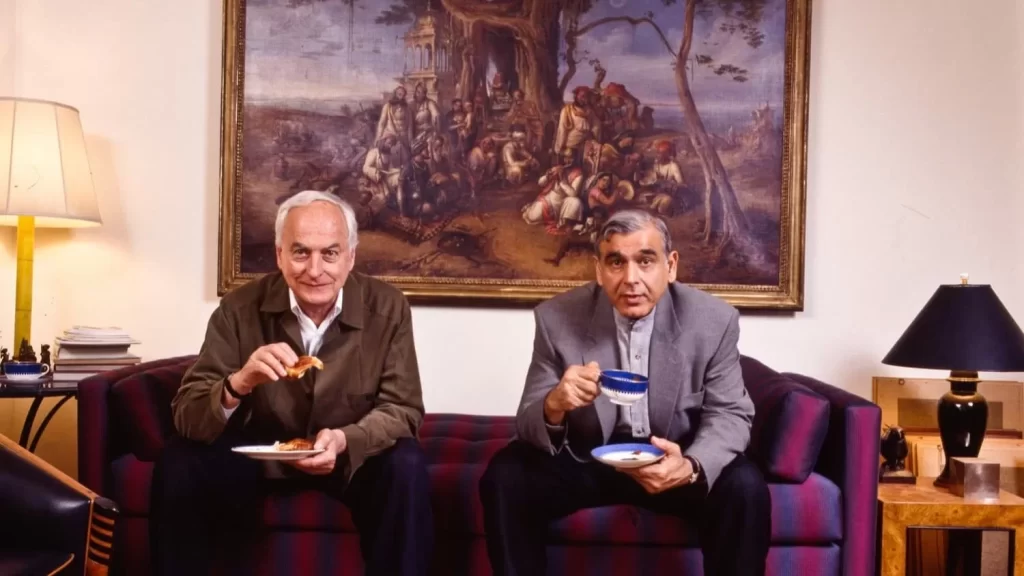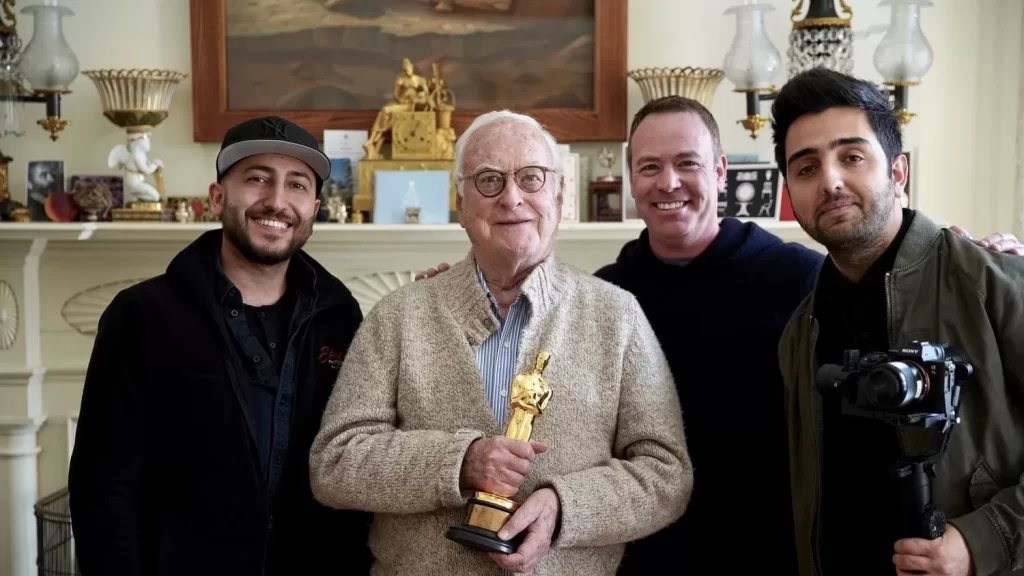A Captivating Journey Through Cinema’s Iconic Partnership
The name “Merchant Ivory” has become synonymous with a particular kind of filmmaking—an adjective in its own right. This term derives from the collaboration between director James Ivory and producer Ismail Merchant, who partnered together from the 1960s until Merchant’s death in 2005. Over time, critics have utilized this hyphenated phrase to denote “costume dramas” broadly and to subtly critique any historical films perceived as lavishly produced yet artistically safe. However, for those familiar with cinema’s rich tapestry, the term encapsulates the essence of a unique production company that once stood as a beacon of quality in the arthouse film scene.


Ismail Merchant, hailing from Bombay, produced a staggering 42 films under the Merchant-Ivory banner. Meanwhile, James Ivory, an unassuming but resolute figure from Oregon, directed 30 of these projects. Notably, 16 of them were penned by Ruth Prawer Jhabvala, a cultural polymath in her own right who deserves her own cinematic tribute. Jhabvala, born in Germany to Jewish immigrants who later moved to England, married Indian architect Cyrus Jhabvala and relocated to New Delhi. She became renowned for her novels exploring Indian themes, including the celebrated Heat and Dust, which Merchant Ivory later adapted into a film. This remarkable continuity of vision among the team is impressive, even by the standards of auteur film analysis.
The finest works produced by Merchant Ivory not only felt timeless upon their initial release but have also earned their place as classics across any cinematic era. Titles such as A Room with a View, Howards End, Maurice, and The Remains of the Day are often cited as masterpieces, while other works like Heat and Dust, The Bostonians, Surviving Picasso, and A Soldier’s Daughter Never Cries remain underrated gems that deserve rediscovery. The 2023 documentary Merchant Ivory, directed by Stephen Soucy, pays tribute to this influential duo and is likely to resonate with anyone who frequented art house cinemas during the 1980s and 1990s, the peak of their creative output.
As a testament to the duo’s importance in the cinematic landscape, the documentary does an admirable job of celebrating their legacy. However, at times, it feels more like an extensive bonus feature on a box set rather than a standalone exploration of their lives, artistic significance, and contributions to cinema. Those seeking a thorough explanation of their impact or an in-depth biography may find themselves better served by conducting their own research or diving into reviews of their films from various eras.
The documentary’s strongest moments arise from the interviews, which serve as the film’s backbone. It lacks the polished, concentrated quality found in the best Merchant Ivory films but succeeds on its own terms as a kind of “hangout” film within the non-fiction genre. Hugh Grant, who starred in Maurice, reflects on the “sublimated lustfulness” he sensed on set, surrounded by stunning actors dressed in elegant, often formal attire. He also sheds light on Merchant’s legendary frugality, recounting how many films were produced under tight budgets. “Very often, films got made and you’d say, ‘Who’s the money behind this film?’ and at that point, there was no money. He still had to get it,” Grant humorously remarks.
Vanessa Redgrave, who graced three Merchant Ivory films, emerges as a compelling and somewhat controlling presence throughout the documentary. Ivory, who was discreet about his sexuality for much of his life, eventually became the oldest Oscar winner after penning the original screenplay for Call Me by Your Name. Merchant shared this aspect of his life, and the film touches upon the romantic and professional partnership that characterized their long association. This relationship was marked by complexities and emotional turmoil, with one witness describing it as “dreadful,” hinting at the depths of their intertwining lives.
The documentary’s most captivating segments include behind-the-scenes footage and still images from their productions, showcasing the dynamic interplay between Ivory, who comes across as calm and responsive, and Merchant, whose animated demeanor is evident.
Positive Aspects
- Definitive Documentary on Merchant Ivory:
- “Merchant Ivory” is the first definitive feature documentary that provides new and compelling perspectives on the partnership of James Ivory and Ismail Merchant, along with their key collaborators. The film uses footage from over fifty interviews, clips, and archival material to give voice to the actors and technicians who defined Merchant Ivory’s work 1.
- Insightful and Intimate Look:
- The documentary offers an elegant and intimate look into the partnership, exploring both the professional and personal aspects of their relationship. It wraps viewers in a blanket of cozy nostalgia while relating the history of their elegant films 2.
- Celebration of Cinematic Creativity:
- The film highlights the transformational cinematic creativity and personal drama of the Merchant Ivory team. It features recollections of Merchant’s unique methods of funding productions and Jhabvala’s critical judgments, providing a nuanced view of their creative process 3.
- Star-Studded Participation:
- The documentary features notable artists such as Dame Emma Thompson, Helena Bonham Carter, Hugh Grant, Vanessa Redgrave, Rupert Graves, and James Wilby, who share their experiences and insights into the Merchant Ivory productions 4.
- Historical and Cultural Significance:
- Merchant Ivory Productions is celebrated for its quality filmmaking over more than 40 years, with acclaimed films like “A Room with a View,” “Howards End,” and “The Remains of the Day.” The documentary underscores their significant contributions to cinema and their lasting legacy 5.
Mixed to Negative Aspects
- Complex Symbolism and Realism:
- While the film’s modest realism and complex symbolic dimension are praised, some viewers may find the narrative structure challenging to follow. The emphasis on detailed interviews and archival footage can be both a strength and a potential barrier to accessibility 6 7.
- Confrontation with Difficult Themes:
- The documentary does not shy away from difficult themes such as the financial struggles and personal conflicts within the team. These themes are essential to the narrative but may be uncomfortable for some viewers 8.
- Narrative and Pacing:
- The film’s narrative, which charts the rise and fall of the company and the gay love story at its core, involves a mix of triumphs and struggles. Some critics have noted that the pacing can be uneven, with moments of humor interspersed with heavy thematic content 9.
- Limited Focus on Individual Contributions:
- Rediscovery and Impact:
- The film’s rediscovery and re-release have sparked discussions about its impact and relevance. While many praise its contribution to film history, others may question its execution and the effectiveness of its message in today’s context 12.
| Factual Information | Details |
|---|---|
| Title | Merchant Ivory |
| Release Year | 2023 |
| Director | Stephen Soucy |
| Main Subjects | James Ivory, Ismail Merchant, Ruth Prawer Jhabvala |
| Notable Actors Featured | Hugh Grant, Vanessa Redgrave |
| Genre | Documentary |
| Runtime | 90 minutes |
| Production Company | Merchant Ivory Productions |
| Key Themes | Artistic collaboration, LGBTQ+ representation, cultural identity, film legacy |
| Noteworthy Films Discussed | A Room with a View, Howards End, Maurice, The Remains of the Day |
Frequently Asked Questions
What is the significance of Merchant Ivory in film history?
Merchant Ivory is a unique collaboration that set a high standard for costume dramas and adaptations, blending literary richness with cinematic elegance. Their films often tackled themes of class, sexuality, and cultural identity, making them a significant part of arthouse cinema.
Who were the key collaborators in Merchant Ivory films?
The duo primarily worked with Ruth Prawer Jhabvala, who penned many of their screenplays, and composer Richard Robbins, who scored a majority of their films. Their collaborations created a distinctive narrative and visual style.
Are there any must-watch films by Merchant Ivory?
Yes, films like A Room with a View, Howards End, and The Remains of the Day are considered classics and are essential viewing for understanding their cinematic legacy.
What themes are explored in Merchant Ivory films?
Their films often explore themes of social class, repression, and cultural conflict, reflecting the complexities of human relationships across different societal contexts.
Is Merchant Ivory (2023) suitable for new audiences?
While it provides valuable insights into the duo’s legacy, newcomers may benefit from watching some of their films first to fully appreciate the documentary’s context and references.
“Merchant Ivory” (2023) is a powerful and thought-provoking documentary that explores the professional and personal partnership of James Ivory and Ismail Merchant. Directed by Stephen Soucy, the film offers an elegant and intimate look at one of the most influential filmmaking partnerships in cinema history. With compelling interviews, archival footage, and insights from notable artists, the documentary celebrates the legacy of Merchant Ivory Productions.
For those interested in film history and the intricate dynamics of creative partnerships, “Merchant Ivory” is a must-watch. Its historical and cultural significance, combined with its relevance to contemporary issues, makes it a noteworthy entry in the canon of documentary filmmaking.



